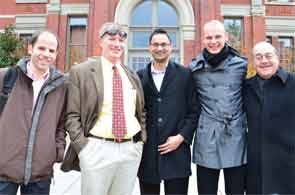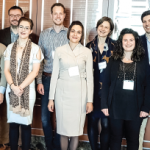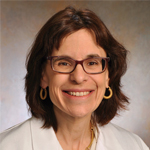
About the Program
The ACR/EULAR International Academic Exchange Program recognizes outstanding early career faculty in rheumatology research—both basic and clinical—and exposes them to the work being done by colleagues overseas. The program allows participants to share knowledge and experience, while creating an opportunity for future collaboration. To learn more, visit www.eular.org and click on “EULAR/ACR exchange” under the Education tab. The next call for applications will be in spring 2014.
Initiated in 1997, the ACR/European League Against Rheumatism (EULAR) International Academic Exchange Program (AEEP) aspired to bring together young rheumatologists from North America and Europe. Since then, more than 40 junior physician-scientists and their senior mentors have travelled across the Atlantic Ocean to share knowledge, experiences, and perspectives with their counterparts from across the pond. The original format of the program has remained virtually unchanged. After attending the annual meeting of the ACR, three European junior rheumatologists visit three selected rheumatology centers in the U.S. The following year, three American fellows attend the annual meeting of EULAR and, thereafter, travel to three European rheumatology centers. Two senior mentors, one representing the ACR and the other EULAR, accompany both groups. Economic tightening led to the AEEP’s suspension between 2009 and 2011, but was then revived by the common efforts of the ACR, EULAR, and Emerging EULAR Network (EMEUNET) in 2012. Fortunate to be among the first participants following its restoration, we would like to impart our personal experiences and discuss the value of this program.
The 2012 Program
Originating from different corners of Europe and investigating various aspects of rheumatologic disease, our heterogeneity fueled diverse conversations. Together with Randy Cron, MD, PhD, and Gabriel Panayi, MD, DSc, our two senior mentors, our interests spanned rheumatology and included inflammatory arthritis, vasculitis, scleroderma, and macrophage activation syndrome. By strategic design, the heterogeneity was reciprocated. We were fortunate to meet colleagues, with both overlapping and distinct interests, approaches, and mentalities, who were working at widely differing institutions in terms of mission, clinical practice, and research.
During the 2012 AEEP, we visited the National Institute of Arthritis and Musculoskeletal and Skin Diseases (NIAMS) (hosted by Drs. Richard Siegel, Robert Colbert, et al.), the Johns Hopkins University Hospital (hosted by Drs. Antony Rosen, Laura Hummers, et al.), and the Feinstein Institute for Medical Research (hosted by Drs. Betty Diamond, Peter Gregerson, et al.). The typical schedule at each of these centers included an introductory session, presentations and discussions about our research projects and those of our hosts, and one-on-one conversations with experts from our shared respective specialist fields. At every site, we encountered enthusiastic interest in our projects, vivid discussions, and cordial atmospheres, which served as fertile soil to start new collaborations and build future networks. We are deeply grateful to our hosts, who seamlessly turned our busy working days into charming evening get-togethers, which were wonderful occasions to socialize with colleagues and establish new friendships.


